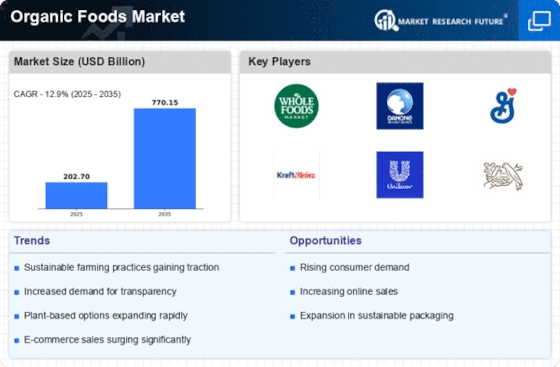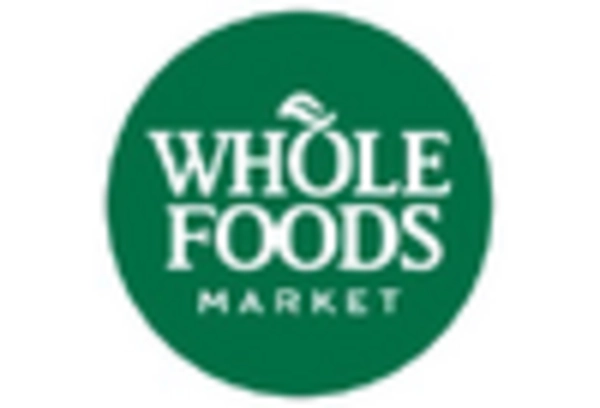Fruits and Vegetables
Grains and Cereals
Dairy Products
Meat and Poultry
Packaged Foods
Supermarkets and Hypermarkets
Specialty Stores
Online Stores
Health Food Stores
Household
Food Service
Catering
USDA Organic
EU Organic
JAS Organic
Other Organic Certifications
North America
Europe
South America
Asia Pacific
Middle East and Africa
North America Outlook (USD Billion, 2019-2035)
North America Organic Foods Market by Product Type
Fruits and Vegetables
Grains and Cereals
Dairy Products
Meat and Poultry
Packaged Foods
North America Organic Foods Market by Distribution Channel Type
Supermarkets and Hypermarkets
Specialty Stores
Online Stores
Health Food Stores
North America Organic Foods Market by End Use Type
Household
Food Service
Catering
North America Organic Foods Market by Certification Type
USDA Organic
EU Organic
JAS Organic
Other Organic Certifications
North America Organic Foods Market by Regional Type
US
Canada
US Outlook (USD Billion, 2019-2035)
US Organic Foods Market by Product Type
Fruits and Vegetables
Grains and Cereals
Dairy Products
Meat and Poultry
Packaged Foods
US Organic Foods Market by Distribution Channel Type
Supermarkets and Hypermarkets
Specialty Stores
Online Stores
Health Food Stores
US Organic Foods Market by End Use Type
Household
Food Service
Catering
US Organic Foods Market by Certification Type
USDA Organic
EU Organic
JAS Organic
Other Organic Certifications
CANADA Outlook (USD Billion, 2019-2035)
CANADA Organic Foods Market by Product Type
Fruits and Vegetables
Grains and Cereals
Dairy Products
Meat and Poultry
Packaged Foods
CANADA Organic Foods Market by Distribution Channel Type
Supermarkets and Hypermarkets
Specialty Stores
Online Stores
Health Food Stores
CANADA Organic Foods Market by End Use Type
Household
Food Service
Catering
CANADA Organic Foods Market by Certification Type
USDA Organic
EU Organic
JAS Organic
Other Organic Certifications
Europe Outlook (USD Billion, 2019-2035)
Europe Organic Foods Market by Product Type
Fruits and Vegetables
Grains and Cereals
Dairy Products
Meat and Poultry
Packaged Foods
Europe Organic Foods Market by Distribution Channel Type
Supermarkets and Hypermarkets
Specialty Stores
Online Stores
Health Food Stores
Europe Organic Foods Market by End Use Type
Household
Food Service
Catering
Europe Organic Foods Market by Certification Type
USDA Organic
EU Organic
JAS Organic
Other Organic Certifications
Europe Organic Foods Market by Regional Type
Germany
UK
France
Russia
Italy
Spain
Rest of Europe
GERMANY Outlook (USD Billion, 2019-2035)
GERMANY Organic Foods Market by Product Type
Fruits and Vegetables
Grains and Cereals
Dairy Products
Meat and Poultry
Packaged Foods
GERMANY Organic Foods Market by Distribution Channel Type
Supermarkets and Hypermarkets
Specialty Stores
Online Stores
Health Food Stores
GERMANY Organic Foods Market by End Use Type
Household
Food Service
Catering
GERMANY Organic Foods Market by Certification Type
USDA Organic
EU Organic
JAS Organic
Other Organic Certifications
UK Outlook (USD Billion, 2019-2035)
UK Organic Foods Market by Product Type
Fruits and Vegetables
Grains and Cereals
Dairy Products
Meat and Poultry
Packaged Foods
UK Organic Foods Market by Distribution Channel Type
Supermarkets and Hypermarkets
Specialty Stores
Online Stores
Health Food Stores
UK Organic Foods Market by End Use Type
Household
Food Service
Catering
UK Organic Foods Market by Certification Type
USDA Organic
EU Organic
JAS Organic
Other Organic Certifications
FRANCE Outlook (USD Billion, 2019-2035)
FRANCE Organic Foods Market by Product Type
Fruits and Vegetables
Grains and Cereals
Dairy Products
Meat and Poultry
Packaged Foods
FRANCE Organic Foods Market by Distribution Channel Type
Supermarkets and Hypermarkets
Specialty Stores
Online Stores
Health Food Stores
FRANCE Organic Foods Market by End Use Type
Household
Food Service
Catering
FRANCE Organic Foods Market by Certification Type
USDA Organic
EU Organic
JAS Organic
Other Organic Certifications
RUSSIA Outlook (USD Billion, 2019-2035)
RUSSIA Organic Foods Market by Product Type
Fruits and Vegetables
Grains and Cereals
Dairy Products
Meat and Poultry
Packaged Foods
RUSSIA Organic Foods Market by Distribution Channel Type
Supermarkets and Hypermarkets
Specialty Stores
Online Stores
Health Food Stores
RUSSIA Organic Foods Market by End Use Type
Household
Food Service
Catering
RUSSIA Organic Foods Market by Certification Type
USDA Organic
EU Organic
JAS Organic
Other Organic Certifications
ITALY Outlook (USD Billion, 2019-2035)
ITALY Organic Foods Market by Product Type
Fruits and Vegetables
Grains and Cereals
Dairy Products
Meat and Poultry
Packaged Foods
ITALY Organic Foods Market by Distribution Channel Type
Supermarkets and Hypermarkets
Specialty Stores
Online Stores
Health Food Stores
ITALY Organic Foods Market by End Use Type
Household
Food Service
Catering
ITALY Organic Foods Market by Certification Type
USDA Organic
EU Organic
JAS Organic
Other Organic Certifications
SPAIN Outlook (USD Billion, 2019-2035)
SPAIN Organic Foods Market by Product Type
Fruits and Vegetables
Grains and Cereals
Dairy Products
Meat and Poultry
Packaged Foods
SPAIN Organic Foods Market by Distribution Channel Type
Supermarkets and Hypermarkets
Specialty Stores
Online Stores
Health Food Stores
SPAIN Organic Foods Market by End Use Type
Household
Food Service
Catering
SPAIN Organic Foods Market by Certification Type
USDA Organic
EU Organic
JAS Organic
Other Organic Certifications
REST OF EUROPE Outlook (USD Billion, 2019-2035)
REST OF EUROPE Organic Foods Market by Product Type
Fruits and Vegetables
Grains and Cereals
Dairy Products
Meat and Poultry
Packaged Foods
REST OF EUROPE Organic Foods Market by Distribution Channel Type
Supermarkets and Hypermarkets
Specialty Stores
Online Stores
Health Food Stores
REST OF EUROPE Organic Foods Market by End Use Type
Household
Food Service
Catering
REST OF EUROPE Organic Foods Market by Certification Type
USDA Organic
EU Organic
JAS Organic
Other Organic Certifications
APAC Outlook (USD Billion, 2019-2035)
APAC Organic Foods Market by Product Type
Fruits and Vegetables
Grains and Cereals
Dairy Products
Meat and Poultry
Packaged Foods
APAC Organic Foods Market by Distribution Channel Type
Supermarkets and Hypermarkets
Specialty Stores
Online Stores
Health Food Stores
APAC Organic Foods Market by End Use Type
Household
Food Service
Catering
APAC Organic Foods Market by Certification Type
USDA Organic
EU Organic
JAS Organic
Other Organic Certifications
APAC Organic Foods Market by Regional Type
China
India
Japan
South Korea
Malaysia
Thailand
Indonesia
Rest of APAC
CHINA Outlook (USD Billion, 2019-2035)
CHINA Organic Foods Market by Product Type
Fruits and Vegetables
Grains and Cereals
Dairy Products
Meat and Poultry
Packaged Foods
CHINA Organic Foods Market by Distribution Channel Type
Supermarkets and Hypermarkets
Specialty Stores
Online Stores
Health Food Stores
CHINA Organic Foods Market by End Use Type
Household
Food Service
Catering
CHINA Organic Foods Market by Certification Type
USDA Organic
EU Organic
JAS Organic
Other Organic Certifications
INDIA Outlook (USD Billion, 2019-2035)
INDIA Organic Foods Market by Product Type
Fruits and Vegetables
Grains and Cereals
Dairy Products
Meat and Poultry
Packaged Foods
INDIA Organic Foods Market by Distribution Channel Type
Supermarkets and Hypermarkets
Specialty Stores
Online Stores
Health Food Stores
INDIA Organic Foods Market by End Use Type
Household
Food Service
Catering
INDIA Organic Foods Market by Certification Type
USDA Organic
EU Organic
JAS Organic
Other Organic Certifications
JAPAN Outlook (USD Billion, 2019-2035)
JAPAN Organic Foods Market by Product Type
Fruits and Vegetables
Grains and Cereals
Dairy Products
Meat and Poultry
Packaged Foods
JAPAN Organic Foods Market by Distribution Channel Type
Supermarkets and Hypermarkets
Specialty Stores
Online Stores
Health Food Stores
JAPAN Organic Foods Market by End Use Type
Household
Food Service
Catering
JAPAN Organic Foods Market by Certification Type
USDA Organic
EU Organic
JAS Organic
Other Organic Certifications
SOUTH KOREA Outlook (USD Billion, 2019-2035)
SOUTH KOREA Organic Foods Market by Product Type
Fruits and Vegetables
Grains and Cereals
Dairy Products
Meat and Poultry
Packaged Foods
SOUTH KOREA Organic Foods Market by Distribution Channel Type
Supermarkets and Hypermarkets
Specialty Stores
Online Stores
Health Food Stores
SOUTH KOREA Organic Foods Market by End Use Type
Household
Food Service
Catering
SOUTH KOREA Organic Foods Market by Certification Type
USDA Organic
EU Organic
JAS Organic
Other Organic Certifications
MALAYSIA Outlook (USD Billion, 2019-2035)
MALAYSIA Organic Foods Market by Product Type
Fruits and Vegetables
Grains and Cereals
Dairy Products
Meat and Poultry
Packaged Foods
MALAYSIA Organic Foods Market by Distribution Channel Type
Supermarkets and Hypermarkets
Specialty Stores
Online Stores
Health Food Stores
MALAYSIA Organic Foods Market by End Use Type
Household
Food Service
Catering
MALAYSIA Organic Foods Market by Certification Type
USDA Organic
EU Organic
JAS Organic
Other Organic Certifications
THAILAND Outlook (USD Billion, 2019-2035)
THAILAND Organic Foods Market by Product Type
Fruits and Vegetables
Grains and Cereals
Dairy Products
Meat and Poultry
Packaged Foods
THAILAND Organic Foods Market by Distribution Channel Type
Supermarkets and Hypermarkets
Specialty Stores
Online Stores
Health Food Stores
THAILAND Organic Foods Market by End Use Type
Household
Food Service
Catering
THAILAND Organic Foods Market by Certification Type
USDA Organic
EU Organic
JAS Organic
Other Organic Certifications
INDONESIA Outlook (USD Billion, 2019-2035)
INDONESIA Organic Foods Market by Product Type
Fruits and Vegetables
Grains and Cereals
Dairy Products
Meat and Poultry
Packaged Foods
INDONESIA Organic Foods Market by Distribution Channel Type
Supermarkets and Hypermarkets
Specialty Stores
Online Stores
Health Food Stores
INDONESIA Organic Foods Market by End Use Type
Household
Food Service
Catering
INDONESIA Organic Foods Market by Certification Type
USDA Organic
EU Organic
JAS Organic
Other Organic Certifications
REST OF APAC Outlook (USD Billion, 2019-2035)
REST OF APAC Organic Foods Market by Product Type
Fruits and Vegetables
Grains and Cereals
Dairy Products
Meat and Poultry
Packaged Foods
REST OF APAC Organic Foods Market by Distribution Channel Type
Supermarkets and Hypermarkets
Specialty Stores
Online Stores
Health Food Stores
REST OF APAC Organic Foods Market by End Use Type
Household
Food Service
Catering
REST OF APAC Organic Foods Market by Certification Type
USDA Organic
EU Organic
JAS Organic
Other Organic Certifications
South America Outlook (USD Billion, 2019-2035)
South America Organic Foods Market by Product Type
Fruits and Vegetables
Grains and Cereals
Dairy Products
Meat and Poultry
Packaged Foods
South America Organic Foods Market by Distribution Channel Type
Supermarkets and Hypermarkets
Specialty Stores
Online Stores
Health Food Stores
South America Organic Foods Market by End Use Type
Household
Food Service
Catering
South America Organic Foods Market by Certification Type
USDA Organic
EU Organic
JAS Organic
Other Organic Certifications
South America Organic Foods Market by Regional Type
Brazil
Mexico
Argentina
Rest of South America
BRAZIL Outlook (USD Billion, 2019-2035)
BRAZIL Organic Foods Market by Product Type
Fruits and Vegetables
Grains and Cereals
Dairy Products
Meat and Poultry
Packaged Foods
BRAZIL Organic Foods Market by Distribution Channel Type
Supermarkets and Hypermarkets
Specialty Stores
Online Stores
Health Food Stores
BRAZIL Organic Foods Market by End Use Type
Household
Food Service
Catering
BRAZIL Organic Foods Market by Certification Type
USDA Organic
EU Organic
JAS Organic
Other Organic Certifications
MEXICO Outlook (USD Billion, 2019-2035)
MEXICO Organic Foods Market by Product Type
Fruits and Vegetables
Grains and Cereals
Dairy Products
Meat and Poultry
Packaged Foods
MEXICO Organic Foods Market by Distribution Channel Type
Supermarkets and Hypermarkets
Specialty Stores
Online Stores
Health Food Stores
MEXICO Organic Foods Market by End Use Type
Household
Food Service
Catering
MEXICO Organic Foods Market by Certification Type
USDA Organic
EU Organic
JAS Organic
Other Organic Certifications
ARGENTINA Outlook (USD Billion, 2019-2035)
ARGENTINA Organic Foods Market by Product Type
Fruits and Vegetables
Grains and Cereals
Dairy Products
Meat and Poultry
Packaged Foods
ARGENTINA Organic Foods Market by Distribution Channel Type
Supermarkets and Hypermarkets
Specialty Stores
Online Stores
Health Food Stores
ARGENTINA Organic Foods Market by End Use Type
Household
Food Service
Catering
ARGENTINA Organic Foods Market by Certification Type
USDA Organic
EU Organic
JAS Organic
Other Organic Certifications
REST OF SOUTH AMERICA Outlook (USD Billion, 2019-2035)
REST OF SOUTH AMERICA Organic Foods Market by Product Type
Fruits and Vegetables
Grains and Cereals
Dairy Products
Meat and Poultry
Packaged Foods
REST OF SOUTH AMERICA Organic Foods Market by Distribution Channel Type
Supermarkets and Hypermarkets
Specialty Stores
Online Stores
Health Food Stores
REST OF SOUTH AMERICA Organic Foods Market by End Use Type
Household
Food Service
Catering
REST OF SOUTH AMERICA Organic Foods Market by Certification Type
USDA Organic
EU Organic
JAS Organic
Other Organic Certifications
MEA Outlook (USD Billion, 2019-2035)
MEA Organic Foods Market by Product Type
Fruits and Vegetables
Grains and Cereals
Dairy Products
Meat and Poultry
Packaged Foods
MEA Organic Foods Market by Distribution Channel Type
Supermarkets and Hypermarkets
Specialty Stores
Online Stores
Health Food Stores
MEA Organic Foods Market by End Use Type
Household
Food Service
Catering
MEA Organic Foods Market by Certification Type
USDA Organic
EU Organic
JAS Organic
Other Organic Certifications
MEA Organic Foods Market by Regional Type
GCC Countries
South Africa
Rest of MEA
GCC COUNTRIES Outlook (USD Billion, 2019-2035)
GCC COUNTRIES Organic Foods Market by Product Type
Fruits and Vegetables
Grains and Cereals
Dairy Products
Meat and Poultry
Packaged Foods
GCC COUNTRIES Organic Foods Market by Distribution Channel Type
Supermarkets and Hypermarkets
Specialty Stores
Online Stores
Health Food Stores
GCC COUNTRIES Organic Foods Market by End Use Type
Household
Food Service
Catering
GCC COUNTRIES Organic Foods Market by Certification Type
USDA Organic
EU Organic
JAS Organic
Other Organic Certifications
SOUTH AFRICA Outlook (USD Billion, 2019-2035)
SOUTH AFRICA Organic Foods Market by Product Type
Fruits and Vegetables
Grains and Cereals
Dairy Products
Meat and Poultry
Packaged Foods
SOUTH AFRICA Organic Foods Market by Distribution Channel Type
Supermarkets and Hypermarkets
Specialty Stores
Online Stores
Health Food Stores
SOUTH AFRICA Organic Foods Market by End Use Type
Household
Food Service
Catering
SOUTH AFRICA Organic Foods Market by Certification Type
USDA Organic
EU Organic
JAS Organic
Other Organic Certifications
REST OF MEA Outlook (USD Billion, 2019-2035)
REST OF MEA Organic Foods Market by Product Type
Fruits and Vegetables
Grains and Cereals
Dairy Products
Meat and Poultry
Packaged Foods
REST OF MEA Organic Foods Market by Distribution Channel Type
Supermarkets and Hypermarkets
Specialty Stores
Online Stores
Health Food Stores
REST OF MEA Organic Foods Market by End Use Type
Household
Food Service
Catering
REST OF MEA Organic Foods Market by Certification Type
USDA Organic
EU Organic
JAS Organic
Other Organic Certifications


















Leave a Comment